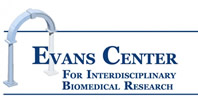The ARC Process
Pre-ARCs serve as intermediate phase of exploration of research themes before becoming a formal ARC. Ideas on Pre-ARC themes have been initiated by investigators as well as by the Evans Center Director. Once a Pre-ARC group is assembled, the group is invited to post here a summary of missions and plans for an ARC, including names and affiliations of PIs who are interested in joining. This 1-2 page outline will provide enough information for other colleagues to consider participation in the Pre-ARC, and eventually ARC (following approval of a review panel). As is the case with the Pre-ARCs and ARCs posted here, the Evans Center Director will discuss such research themes, and provide insight as needed. For additional information, please contact Dr. Katya Ravid.
The Process
Pre-ARC
A pre-ARC assembly is required as it allows a group to explore in more depth a research theme via meetings or workshops prior to applying for an ARC status and funding. During the pre-ARC phase, investigators approach Dr. Ravid with a suggested theme (at times, also vice versa), and Dr. Ravid meets with the group several times.
Funding is available for pre-ARCs to organize meetings and seminars over a period of about six months.
Pre-ARC to ARC
Following self selection the pre-ARC decides, often in consultation with Dr. Ravid, whether to submit an ARC application (available in ECIBR or IBRO web sites.Applications are due in May each year. An ARC review panel, consisting of 9-12 senior investigators reviews and scores applications using NIH scaling. Reviewers are selected based on expertise in ARC research topics and in consultation with other BU leadership. Applicants are notified within 2 weeks, including constructive critiques.
ARC status and funding
Once an ARC receives a high score, it is funded for a year. Funding has ranged from 50-75K per year per ARC, depending on careful justification. Yearly reports are submitted and funding can be renewed for up to 3 years pending yearly review with a rigorous set of criteria.
Graduated ARC to ARC-Program
Graduated ARCs can become ARC programs based on securing extramural funding, and through this ARC-Program status a new field of research is created at BU. Some funding is available to such successful ARC-programs for organizing a research retreat and workshops.
Form a new ARC?
Members of a graduated ARC could assemble a new ARC, if the theme is novel and innovative.
Key Elements of an ARC
Metrics
Yearly evaluation of ARCs is based on:
- Scholarly output
- Relatively new (at BU) research areas and grouping
- New grant proposals, including training grants
- Faculty and trainee research networking monitored by IBRO using research network analysis
- Collaborative work with the CTSI towards development of new diagnostic or therapeutic approaches
Research Plan
Each ARC should have a research plan that:
- Is a compelling biomedical problem
- Reflects an interdisciplinary approach to a new area and includes plans for internal and external research interaction and communications
- Has potential to endure beyond an initial three-year funding period
- Is the highest quality science
- Has a training component
- Could lead to additional collaborations in and outside BU
- Does not duplicate an exciting center, unit of program
IBRO ARC Leadership
IBRO expects co-leadership of faculty from MED and CR campuses.
Interdisciplinary
ARC consists of at least 5 active investigators and need faculty from 3 or more BU departments and at least one department from the CRC and Medical Campuses of BU, including DOM. Past ARCs usually ranged between 7 to 21 members.
Summary of Pre-ARCs
Since 2009 Pre-ARCs were also explored on the following topics:
Eliminating Health Disparities: Society & Biomedicine; Director: Dr. Tracy Battaglia (Nov 2020)
Platform Development for Evaluation of Tryptophan Metabolites and the Cancer Microbiome; Director: Dr. Matthew Kulke; Co-Director: Dr. Evan Johnson (June 2018-2020)
Effect of Violent and traumatic Events [EVE]: An E-cohort study; Co-Directors: Drs.Bindu Kalesan, Guanglan Zhang and Francesca Seta (February 2018)
Environmental Toxicants; Co-Directors: Drs. David Sherr, Stefano Monti, Jonathan Levy and Jessica Fetterman (December 2017)
Metabolic Clinical Research Collaborative; Co-Directors: Drs. Jude Deeney, Markus Bachschmid and Barbara Corkey (May 2016-2017)
Comparative Effectiveness: A focus on Processes of Care Among Critically Ill Patients; Dr. Allan Walkey (2013)
Stromal Biology and Cancer; Drs. Douglas Faller, Tien Hsu, Maria Trojanowska (2013)
Disease risk Assessment and risk prediction; Drs. Vasan Ramachandran, Michael Pencina, Vanessa Xanthakis (2012)
Immunobiology of Trauma; Dr. Daniel Remick (2010)
Vaccine Immunology and Development; Dr. Lee Wetzler (2009)
Biomechanics and Osteoarthritis; Dr. David Felson (2009)
